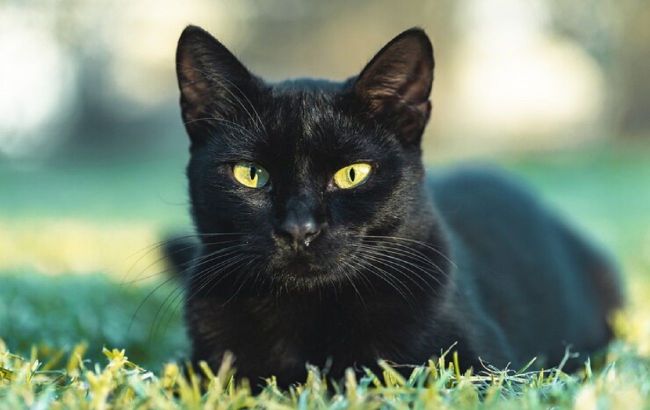Black cat - bad luck or warning? Here's what you need to know
 Why black cats are associated with bad luck (photo: Freepik)
Why black cats are associated with bad luck (photo: Freepik)
The black cat has been a symbol of mystery and mysticism for centuries. But does it really bring bad luck, or does it warn of danger?
RBC-Ukraine explains when and how the black cat superstition emerged.
Origin of the black cat superstition
The connection between humans and cats can be traced back to some of the world's oldest civilizations. In Ancient Egypt, for example, they were considered divine symbols.
Cats have also appeared in Greek mythology. Hecate, the goddess of magic, the moon, and witchcraft, is described as a pet and a familiar (a supernatural being who helps a witch, according to European folklore).
Written records link black cats to the occult as far back as the 13th century, when Pope Gregory IX issued an official church document titled Vox in Rama on June 13, 1233.
"It declared black cats to be the incarnation of Satan," says Layla Morgan Wilde, author of Black Cats Tell All: True Tales And Inspiring Images.
This edict marked the beginning of the Inquisition and the church-sanctioned hunt for heretics and witches. It was originally intended to suppress the growing Luciferian cult in Germany but quickly spread throughout Europe.
Cats and witches were seen as a threat to the early Christian church
In addition to their early association with Satan, cats also became inextricably linked to witches in medieval Europe. According to Cerridwen Fallingstar, a Wiccan priestess and author of Broth from the Cauldron: A Journey of Wisdom through Everyday Magic, witches were quite common in pre-Christian pagan times.
Although the early Christian church in Europe coexisted with witches, as the church gained power, it began to see them as competitors in the struggle for the hearts and minds of the people. This led to massive hunts, persecution, torture, and murder of women.
"Witches revered the natural world, having a deep respect for plants and animals," says Fallingstar, adding that this is why the close relationship between humans and animals was seen as "diabolical."
But early Christians were not only afraid of the connection that was invented between witches, cats, and the devil, but they also saw them as a threat.
"Cats, like women accused of witchcraft, tend to show a healthy disrespect for authority. They do not flatter like dogs, even to unworthy people. Neither independent women nor independent animals could be tolerated in the church," Cerridwen Fallingstar notes.
At some point, the combination of witches and cats narrowed down to black cats only, although the author of the book says it is not entirely clear why this happened. Fallingstar comments that the relationship between witches and black cats is probably fictional, but it is possible that black cats make better mousers because they are harder to see at night and therefore have an advantage in hunting.
After all, the fear of black cats and their connection to witchcraft made its way across the Atlantic with the Puritan colonists, notes Daniel Compara, an associate professor of English and Literature at the University of Toledo.
In the Middle Ages, it was not uncommon to kill cats, given their association with evil, Compara says. Some people even blamed cats for spreading the bubonic plague and made it another reason to get rid of them. However, their ill-conceived plan backfired.
"In a particularly ironic twist, killing cats contributed to the spread of the plague. With fewer cats controlling the rodent population, the disease spread rapidly," explains Compara.
Superstition of the black cat crossing your path
Given the belief in medieval Europe that the devil and witches could take the form of black cats, it is logical that superstitions related to their path emerged.
"Therefore, a black cat that crosses your path may well be on a mission from a witch. Just as easily, it could be the devil in disguise - and no one wants to cross paths with the devil. This explains why a black cat crossing your path is considered bad luck," says folklorist and artist Phoebe Millerwhite.
This belief continued in the Renaissance when a black cat crossing your path could mean that a witch had sent her familiars to harm you.
"Many frightened peasants of the time would rush to the nearest church and pay for a priest to bless them and rid them of any curse that might have been placed by the cat. Since it was a source of income for the church, such fears were most likely encouraged," the artist says.
The idea that black cats are bad luck is not universal. Some cultures believe that they bring good luck.
Their resemblance to the cat goddess Bastet was the reason why they were honored in ancient Egypt. In other countries, such as Scotland and Japan, black cats symbolize prosperity.
Sources: History, Annie Wright Inkwell.

